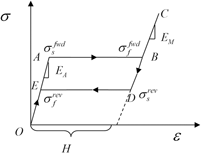Published online by Cambridge University Press: 15 November 2018

An analytical research is developed using the averaging technique of composites for the macroscopic behaviors of porous shape memory alloy (SMA) beam with different porosity under pure bending. The whole material is regarded as a composite beam of porous SMA and dense SMA, in which the component fractions of the porous SMA show gradient changes over geometric dimension. To get the theoretical solution of such material under pure bending, the Mises yield theory and the ideal elastoplastic model are used to describe the phase transition of the material. The macroscopic behaviors of the porous SMAs beam with different porosity are then simulated using the averaging technique of composites. Examples for a porous SMA beam with gradient porosity from 0 to 50% considering the tension compression asymmetry of the SMAs are then supplied; the results show that after transformation the stress distribution in the whole material is lower than in the case of the pure elastic gradient porous materials, and for different part of the SMA with different porosity shows different strength characters.